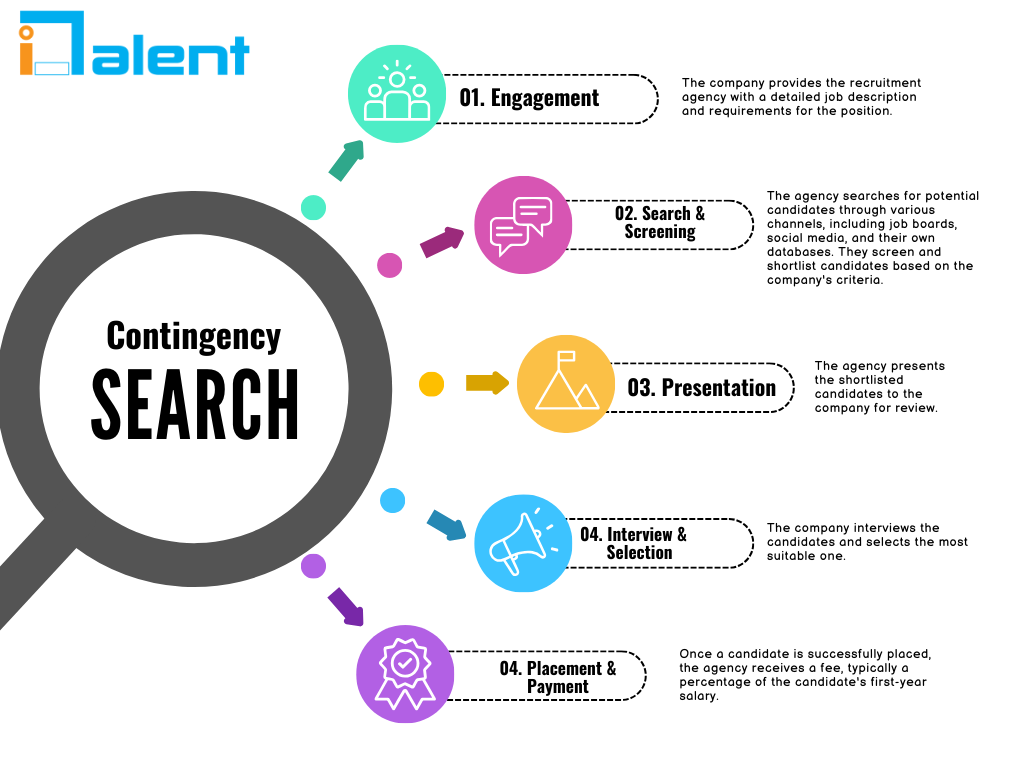
In the competitive world of talent acquisition, businesses often face the challenge of finding the right candidates quickly and efficiently. One popular method to address this challenge is contingency search. This recruitment strategy offers a flexible and cost-effective solution for companies looking to fill positions without upfront financial commitments. Let’s explore what contingency search is, how it works, and its advantages and disadvantages.
What is Contingency Search?
Contingency search is a recruitment process where a company engages one or more recruitment agencies to find suitable candidates for a job opening. The key feature of this model is that the agency only gets paid if they successfully place a candidate in the position. This “no placement, no fee” approach makes it an attractive option for businesses that want to minimize financial risk.
How Does Contingency Search Work?
- Engagement: The company provides the recruitment agency with a detailed job description and requirements for the position.
- Search and Screening: The agency searches for potential candidates through various channels, including job boards, social media, and their own databases. They screen and shortlist candidates based on the company’s criteria
- Presentation: The agency presents the shortlisted candidates to the company for review.
- Interview and Selection: The company interviews the candidates and selects the most suitable one.
- Placement and Payment: Once a candidate is successfully placed, the agency receives a fee, typically a percentage of the candidate’s first-year salary.
Advantages of Contingency Search
- Cost-Effective: Companies only pay for successful placements, reducing financial risk.
- Speed: Multiple agencies can work on the same position, increasing the chances of finding a suitable candidate quickly.
- Flexibility: Companies can engage multiple agencies simultaneously, ensuring a broader reach and more candidate options.
Disadvantages of Contingency Search

-
- Quality vs. Quantity: Agencies may prioritize speed over quality, leading to a higher volume of candidates but not necessarily the best fit.
- Lack of Exclusivity: Since multiple agencies may be working on the same position, there can be less commitment to finding the perfect match.
- Limited Focus: Agencies might not invest as much time and resources into understanding the company’s culture and specific needs compared to retained search models.
When to Use Contingency Search
Contingency search is ideal for companies that need to fill positions quickly and are looking for a cost-effective recruitment solution. It works well for mid-level positions and roles where there is a large pool of available candidates. However, for senior-level or highly specialized positions, a retained search might be more appropriate due to the need for a more focused and dedicated approach.
Conclusion
In conclusion, contingency search offers a flexible and efficient way for companies to find the right talent without upfront costs. While it has its drawbacks, such as potential compromises on candidate quality, it remains a popular choice for many businesses due to its cost-effectiveness and speed. By understanding the nuances of this recruitment service, companies can better leverage this recruitment strategy to meet their hiring needs.
If you are looking for a Contingency Search or Executive Search Service Firm for your business expansion in Vietnam market, Invest Talent JSC is your trustful choice!
Contact us for a free consulting about Vietnam market:
Website: https://int-hragent.com/
Email: [email protected]
Phone: +84 866-047-046

